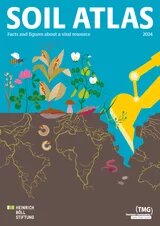
Agroecology is a response to an industrial model of agriculture that exploits people and damages soils. In Brazil, agroecology is making significant breakthroughs in social and environmental terms. But one thing is already clear: government policy is needed to promote agroecology and confront the agroindustrial model.

Industrial agriculture relies on extensive monocultures, immense chemical inputs, and heavy machinery. This model originated in the Global North. Beginning in the 1960s, it was exported to Asia, Latin America, and later Africa. This much vaunted Green Revolution has taken a heavy toll on soils: excessive pesticide use reduces microbiological life in the soil and contaminates water, and machinery compacts the soil and hinders drainage. Moreover, the agroindustrial model works best on large farming units, fostering concentration of ownership and rural depopulation, while monocultures diminish dietary variety.
Agroecology arose as an alternative to this model. Farming in Brazil offers plentiful examples of both the impacts of agro-industrial practices and attempts to create alternatives based on agroecology. Over the last four decades, Brazil has emerged as a major exporter of agricultural commodities, especially beef, coffee, maize, soybean, and sugar. In the course of this expansion, vast areas have been deforested, desertification has accelerated, water resources have been depleted or contaminated, and biodiversity has declined. In response, social movements, researchers, and small-scale farmers are coming together under the umbrella of agroecology to revive and expand a series of farming practices that traditional communities never stopped using.
Agroecology is a bundle: it is a multidisciplinary science, a social movement, and a set of agricultural practices focused on the interaction of plants, animals, and humans. Its aims are to preserve natural resources and sustain agrifood systems. Healthy soils are the foundation of this approach since they support diverse microbial life and the nutrient cycle essential for plant growth. By prioritising soil conservation and biodiversity within soil ecosystems, agroecology aims to increase productivity while minimising environmental impact. It involves soil management methods, including the use of green manure, crop rotation and intercropping, the integration of native trees, erosion control, and the use of crop varieties adapted to local conditions. Agroecological coffee farming, for example, has increased plant biodiversity and improved soil quality in Brazil’s Atlantic forest, and agroforestry systems have enhanced soil fertility and soil health.
Agroecology is not only based on ecological principles; it also promotes social, economic and territorial values that apply grassroots solutions to local problems. It promotes the self-management and autonomy of family farms, and independence from seed and agrochemical companies. It respects the traditional knowledge and cultural dynamics that were systematically erased by colonial structures.
As a social movement, agroecology also advocates for better access to land, environmental justice, as well as age, racial, and gender equity. These principles seek to integrate and empower social groups that have historically been exploited by the industrial food system. The latest agricultural census reveals that men manage 81 percent of Brazilian farms. Women have been largely restricted to the household, and their farming activities to the vicinity of the house. For this reason, one of the priorities of agroecology has been to recognise women’s backyard production and help them commercialise it. The number of women who lead production and marketing initiatives is increasing. Women also take the lead in Brazil’s largest pro-agroecology grassroots demonstration, March of the Daisies, which takes place every four years. In 2023, this brought more than 100,000 women smallholders to the streets of Brazil’s capital, Brasília.
Agroecology initiatives in Brazil used to be fragmented, but since the turn of the century they have influenced policy to upscale production so that more people have access to food produced through agroecological methods. Two such policies are the federal Food Acquisition Programme (PAA) and the National School Feeding Programme (PNAE). In 2009, PNAE began to prioritise family farms in sourcing food for more than 40 million students in over 160,000 schools. The PAA focuses on buying produce from family farmers and distributing it to social assistance organisations. Since December 2023, changes in the guidelines of school feeding in Brazil further encourage the consumption of organic and agroecological products.
Another example of policies promoting agroecology is the National Policy for Agroecology and Organic Production (PNAPO). Established in 2012, this aims to promote an agroecological transition. For example, the PNAPO lowered interest rates on loans for farmers who produce items in a basic nutritional food basket using agroecological methods, as well as increased rural technical assistance. A change in government in 2016 prevented the plan from getting off the ground, but since the end of the Bolsonaro presidency in 2023, the PNAPO has resumed. Another initiative, the National Programme to Strengthen Family Farming (PRONAF), provides loans to agroecological family farms. Despite its importance, the PRONAF budget is still dwarfed by the finance available to large-scale agribusiness in Brazil.
Brazil has shown that public institutions play a key role in promoting agroecology. The dominant model still regards soil merely as an inert input. Agroecology, which puts soil in its rightful place – as a living, central part of the food cycle – is still underrepresented within the policy architecture.


